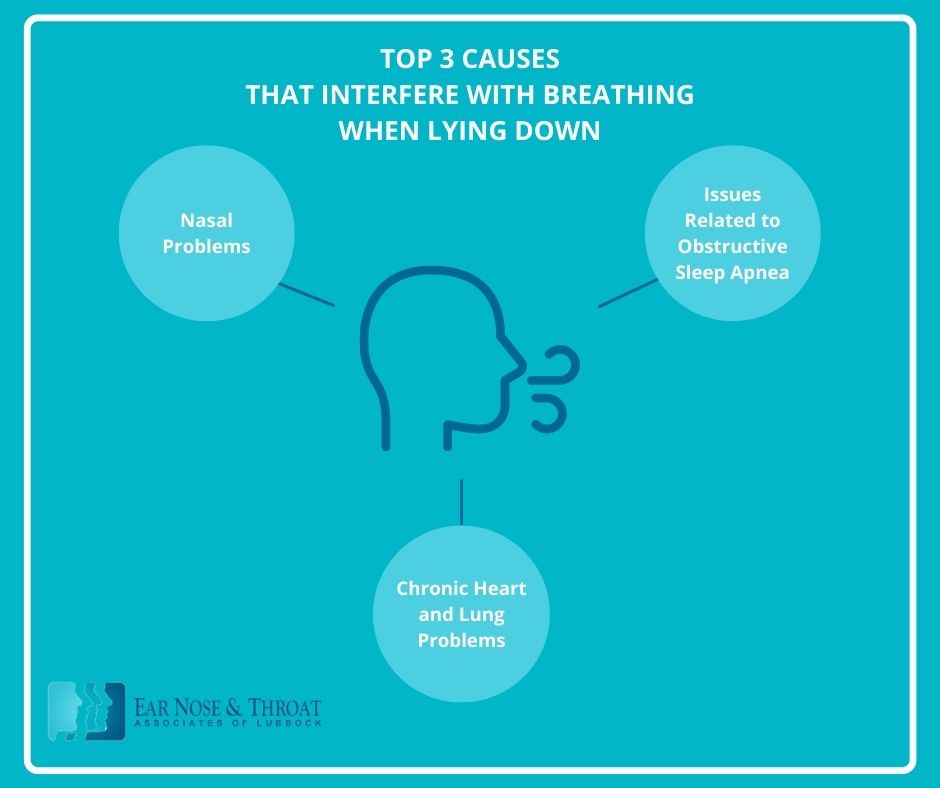Can’t Breathe Through Your Nose When Lying Down?

Few things are as uncomfortable as being unable to breathe while you’re lying down.
If you can relate, you might assume nasal problems are causing your breathing issues. In many cases that’s true, but other medical conditions can also contribute. To help you determine what’s going on, we’ll review some of the top culprits that interfere with breathing through your nose when lying down.
Cause #1: Nasal Problems
Nasal issues are the most common reason people feel like they can’t breathe through their nose when lying down. These include:
Allergies
Allergic rhinitis, also known as seasonal allergies, can sometimes cause breathing issues at night. Here in West Texas, common allergens like ragweed and dust can wreak havoc on our lives. They make it difficult to breathe during the day, let alone at night when we lie down to rest.
Uncomfortable symptoms like nasal congestion and sneezing affect your ability to breathe. They also tend to worsen at night, especially if your sleep environment is full of allergens like pet dander or dust. As a result, you might struggle to fall asleep or stay asleep, causing even further issues like daytime drowsiness.
If treatments like over-the-counter allergy medications and saline irrigation systems aren’t helping, or if you’re experiencing new or worsening allergy symptoms, an ENT doctor can help you investigate the problem and find relief.
Nasal Polyps
Nasal polyps are soft, noncancerous growths in the nose. They aren’t painful, but they can interfere with breathing. They hang like teardrops from the lining of your nasal passages and can sometimes become inflamed, blocking your airway. When you lie down, larger growths block your nasal passages and make it hard to breathe.
Nasal polyps don’t usually develop until you’re well into adulthood. People with asthma, allergies, nasal inflammation, or repeated infections are more likely to develop them. Nasal polyps don’t always produce symptoms, but they can sometimes cause:
- Snoring
- Stuffy nose
- Runny nose
- Headache
- Nosebleed
- Postnasal drip
- Sinus pressure
- Loss of smell or taste
Once nasal polyps get big enough, sleep apnea, sinus infections, and other breathing problems can become issues, too.
An ENT doctor can diagnose nasal polyps based on your health history, symptoms, and a quick look inside your nose. Several treatment options can reduce symptoms or cure the polyps, like:
- Steroid sprays
- Oral steroids
- Medication injections
- Outpatient surgery
Deviated Septum
With this condition, the thin wall of cartilage and bone between your nasal passages is crooked, making the nasal passage on one side smaller than the other and disrupting your breathing.
We often associate a deviated septum with a broken nose, but that’s not always the case. Sometimes people are born with it, or it can be caused by an injury to the nose, like a car crash or sports injury.
One of the most common complaints among people with a deviated septum is nasal congestion. The congestion is usually more severe on one side of the nose, so they may find it easier to sleep on one side at night. They might also snore and wake up with a dry mouth since they can’t breathe well through their nose while lying down.
Septoplasty surgery can correct the breathing problems caused by a deviated septum. An ENT surgeon performs this corrective surgery under general or local anesthesia (depending on the severity of the deviated septum).
During the procedure, the surgeon makes a small incision inside the nose to straighten the nasal septum. This simple correction helps improve airflow through the nose.
Chronic Sinusitis
Chronic sinusitis is a condition where your sinuses remain swollen and inflamed, interfering with mucus drainage and making your nose feel stuffy. Typically, it’s caused by an infection, allergies, a deviated septum, or nasal polyps and can affect both adults and children.
Chronic sinusitis often makes it difficult to breathe through your nose while lying down. It can also make the area around your eyes and cheeks feel swollen and tender. The symptoms are generally similar to a cold, but chronic sinusitis lasts much longer, often at least 12 weeks.
Other symptoms of chronic sinusitis include:
- Runny nose
- Postnasal drip
- Nasal congestion
- Poor sense of smell and taste
- Cough
- Headache
- Sore throat
- Bad breath
- Fatigue
- Ear pain
If your symptoms aren’t responding to treatment or you’ve had them for longer than 12 days, an ENT doctor can help by identifying and treating the underlying condition.
Cause #2: Issues Related to Obstructive Sleep Apnea
If you can’t breathe through your nose when lying down, it could be related to obstructive sleep apnea (OSA). OSA is the most common sleep-related breathing disorder. It occurs when you have excess soft tissues around your throat. When you sleep, the muscles in your neck, throat, and tongue relax, and those extra soft tissues can block your airway, causing breathing problems.
One of the most common signs of OSA is loud snoring, but others include:
- Episodes of paused breathing while you sleep
- Abruptly waking up choking or gasping for air
- Having a headache, dry mouth, or sore throat when you wake up
- Feeling excessively sleepy during the day
Not everyone who snores has OSA, but if you notice one or more of the above symptoms, it’s a good idea to call a doctor and get checked out.
Cause #3: Chronic Heart and Lung Problems
Chronic heart and lung problems sometimes make you feel short of breath when you lie down. Although this is the least common cause of breathing issues at night, it’s a possible (and more serious) cause you should consider.
If your heart isn’t pumping blood as well as it should, your body isn’t getting the oxygen it needs. Fluid can also build up in your lungs, making you feel like you can’t breathe when you lie down.
Shortness of breath is a common symptom of heart and lung problems, and other possible signs include:
- Increased heart rate
- Heart palpitations (racing, fluttering, or pounding heartbeat)
- Coughing and wheezing
- Weight gain
- Nausea
- Confusion/cognitive impairment
- Swelling of the feet and ankles
Heart disease and lung conditions can be life-threatening, so you should see a doctor immediately if you’re experiencing any of the above symptoms alongside breathing issues. With the proper treatment, heart and lung conditions are manageable.

When to See an ENT Doctor
If you or your partner have concerns about how well you breathe while lying down, a reputable ENT doctor is the best person to help you determine the root cause. They can evaluate your symptoms, order a sleep study to test for sleep apnea, and advise you on next steps to take.
At ENT Associates of Lubbock, we’re invested in our patients’ quality of life and can help you get relief from breathing issues. If you regularly can’t breathe through your nose when lying down, schedule an appointment with an ENT doctor today.
Dr. Scolaro is a board-certified Otolaryngologist servicing the South Plains area. He has been practicing in Lubbock since 1990 and has earned a reputation as a skilled and experienced surgeon. He currently serves as the Medical Director for Covenant High Plains Surgery Center campuses, is a member of Covenant Health Partners and is an adjunct faculty professor for Texas Tech University Health Sciences Center School of Medicine. Learn more about Dr. Scolaro.
Categories:








